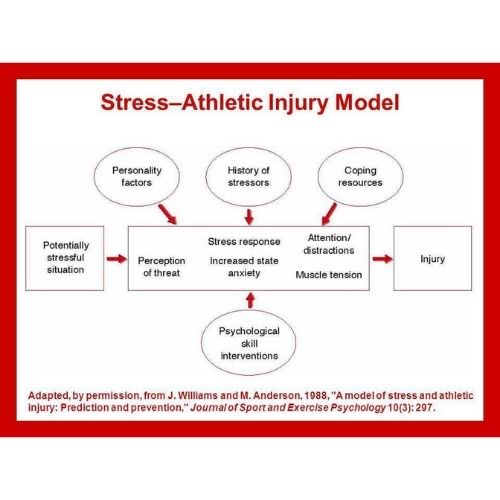
How Your Psychological State Affects Injury
Many have experienced or observed someone who has experienced an injury related to performing some physical activity. Injury is inherently a risk despite taking all the necessary precautions, especially in more vigorous physical activities. With the help of scientific research, this brief blog addresses the psychological contributions, reactions, and rehabilitation to injury.
Contributions
Physical factors are the leading causes of injury while performing an activity (muscle imbalance, overtraining, fatigue), but psychological factors can also play a big part. Sports psychologists Jean Williams and Mark Andersen (Andersen & Williams, 1988; Williams & Andersen, 1998, 2007) developed a model between stress and athletic injury.
When a person encounters a stressful situation, their perception of the threat can increase state anxiety, contributing to changes in focus or attention and muscle tension, leading to an increased risk for injury.

In addition, personality factors, history of stressors, and coping resources influence the stress process and the probability of injury. Stressors can be major or minor, but studies have shown that people with higher levels of life stress experience more injuries than those with less stress in their lives. Specifically, research has found that those with low social support and soft coping skills are at a greater risk for injury. Personality also plays a part in the occurrence of injury. Specifically, personality factors moderate the stress-injury relationship. So if a person characterizes themselves by high trait anxiety, they may have an increased risk compared to someone who has low trait anxiety.
Reactions
It is essential to understand these causes to raise awareness of people's emotional responses and other reactions associated with injury. Researchers found that exercisers and athletes who become injured often follow a five-stage grief response process. These stages can, but do not always, include:
1. denial,
2. anger,
3. bargaining,
4. depression, and
5. acceptance and reorganization.
Most people who get injured tend to exhibit three general response categories:
1. Injury-relevant information processing- Focus on information related to the pain of the injury, awareness of the extent of the injury, and questions about how the injury happened, recognizing the negative consequences or inconvenience.
2. Emotional upheaval and reactive behavior- Become emotionally agitated, experience vacillating emotions, feel emotionally depleted, experience isolation, disconnection, feel shocked, disbelief, denial, and self-pity.
3. Positive outlook and coping- Accepts the injury and deals with it, initiates positive coping efforts, exhibits a good attitude, and is optimistic, relieved to sense progress.
Personality and social factors will also affect the speed and ease they progress so that each individual will vary widely.
Other significant psychological reactions to injury include:
1. Identity loss- An essential part of themselves is lost, seriously affecting self-concept.
2. Fear and anxiety- Worry whether they will recover or re-injury will occur.
3. Lack of confidence- Since they cannot practice their routine, they may lose faith, leading to decreased motivation, inferior performance, or even additional injury if they overcompensate.
4. Performance decrements- Lowered confidence and missed session time leading to post-injury performance declines. As a result, many have difficulty lowering their expectations and may expect to return to a pre-injury level of performance.
Stress impacts physiological injury recovery. Researchers Cramer Roh and Perna (2000) found that high levels of depression and stress can disrupt the body's natural healing process. Psychological stress increases catecholamines and glucocorticoids, impairing the movement of healing immense cells to the injury site, and interferes with the removing damaged tissue. It can also decrease the actions of insulin-like growth hormones that are vital during the rebuilding process. Stress also negatively influences sleep quality, which can interfere with psychological recovery.
Rehabilitation
Although psychological stress, personality, and emotions can contribute to injury, more importantly, research has shown that these factors play a significant role in recovery. People who develop and master psychological skill interventions will more likely experience a more effortless and quicker recovery. There are four critical skills to learn:
1. Goal Setting
2. Positive Self-Talk
3. Imagery or Visualization
4. Relaxation training
It is also essential to learn how to cope with setbacks along the recovery journey. For example, learn to discuss feelings with others close to you and maintain a positive attitude. Social supports can take many forms and help the injured person feel less isolated and included. Make sure you have a solid social support network. They will be needed throughout the recovery process but are most important immediately following the injury. Another good way to help injured people cope is to learn from others who have experienced similar setbacks and heed their recommendations. Learning from others is a great way to recover better and reduce the chances of it happening again or even making it worse.
Summary
In conclusion, psychological factors influence the occurrence of injury, responses to injury, and injury recovery. Injured exercisers and athletes exhibit various psychological reactions. Psychological skills facilitate the rehabilitation process. This information can be detrimental to a person's happiness and life satisfaction if they do not have the knowledge or resources to recover from an injury psychologically.
Caleb Campbell
Masters in Kinesiology, Certified Personal Trainer - NASM, BCS
References
Andersen, M.B., & Williams, J.M. (1988). A model of stress and athletic injury: Prediction and prevention. Journal of Sport and Exercise Psychology, 10, 294-306.
Cramer Roh, J.L., & Perna, F.M. (2000). Psychology/counseling: A universal competency in athletic training. Journal of Athletic Training, 35(4), 458-465.
Williams, J.M., & Andersen, M.B. (1998). Psychosocial antecedents of sports injury: Review and critique of the stress and injury model. Journal of Sport and Exercise Psychology, 10, 5-25.
Williams, J.M., & Andersen, M.B. (2007). Psychosocial antecedents of sports injury and interventions for risk reduction. In G. Tennebaum & R.C. Eklund (Eds.), Handbook of sport psychology (3rd ed., pp. 379-403). Hoboken, NJ: Wiley.
Weinberg, R.S., & Gould, D. (2011). Foundations of sport and exercise psychology. (5th ed., pp. 447-461). Champaign, IL. Human Kinetics




